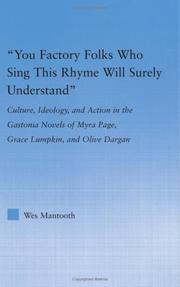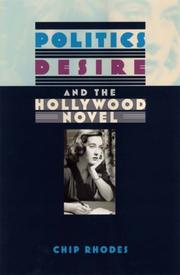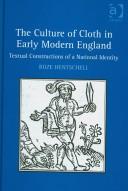| Listing 1 - 3 of 3 |
Sort by
|

ISBN: 1135515395 1281082422 9786611082420 0203960173 9780203960172 0415977584 9780415977586 Year: 2006 Publisher: New York, New York ; London, [England] : Routledge,
Abstract | Keywords | Export | Availability | Bookmark
 Loading...
Loading...Choose an application
- Reference Manager
- EndNote
- RefWorks (Direct export to RefWorks)
American fiction --- Strikes and lockouts in literature. --- Textile industry in literature. --- Labor movement in literature. --- History and criticism. --- Page, Myra, --- Lumpkin, Grace, --- Burke, Fielding, --- Gastonia (N.C.) --- Appalachian Region, Southern --- In literature.

ISBN: 1587297558 9781587297557 9781587296291 1587296292 Year: 2008 Publisher: Iowa City : University of Iowa Press,
Abstract | Keywords | Export | Availability | Bookmark
 Loading...
Loading...Choose an application
- Reference Manager
- EndNote
- RefWorks (Direct export to RefWorks)
Politics, Desire, and the Hollywood Novel pays close attention to six authors-Nathanael West, Raymond Chandler, Budd Schulberg, Joan Didion, Bruce Wagner, and Elmore Leonard-who have toiled in the film industry and written to tell about it. More specifically, Rhodes considers both screenplays and novels with an eye toward the different formulations of sexuality, art, and ultimately political action that exist in these two kinds of storytelling.
Desire in literature. --- Motion picture industry in literature. --- American fiction --- History and criticism. --- Leonard, Elmore, --- Wagner, Bruce, --- Didion, Joan --- Chandler, Raymond, --- Schulberg, Budd --- West, Nathanael, --- Леонард, Элмор, --- לנארד, אלמור, --- צ׳אנדלר, ריימונד, --- צ׳נדלר, ריימונד, --- レイモンドチャンドラー, --- Schulberg, Seymour Wilson, --- Weinstein, Nathan, --- וסט, נתנאל, --- Criticism and interpretation. --- Hollywood (Los Angeles, Calif.) --- Hūlīwūd (Los Angeles, Calif.) --- Hollywood (Calif.) --- In literature. --- Desire in literature --- Motion picture industry in literature --- 82:791.43 --- 82:791.43 Literatuur en film --- Literatuur en film --- History and criticism --- Leonard, Elmore

ISBN: 9780754663010 9781315615219 9781317036685 9781317036692 9781138259867 Year: 2008 Publisher: Farnham Ashgate
Abstract | Keywords | Export | Availability | Bookmark
 Loading...
Loading...Choose an application
- Reference Manager
- EndNote
- RefWorks (Direct export to RefWorks)
Through its exploration of the intersections between the culture of the wool broadcloth industry and the literature of the early modern period, this study contributes to the expanding field of material studies in sixteenth- and seventeenth-century England. The author argues that it is impossible to comprehend the development of emerging English nationalism during that time period, without considering the culture of the cloth industry. She shows that, reaching far beyond its status as a commodity of production and exchange, that industry was also a locus for organizing sentiments of national solidarity across social and economic divisions. Hentschell looks to textual productions - both imaginative and non-fiction works that often treat the cloth industry with mythic importance - to help explain how cloth came to be a catalyst for nationalism. Each chapter ties a particular mode, such as pastoral, prose romance, travel propaganda, satire, and drama, with a specific issue of the cloth industry, demonstrating the distinct work different literary genres contributed to what the author terms the "culture of cloth."
History of civilization --- Great Britain --- 391 <41> --- 687 <41> --- Kleding. Mode. Sieraden. Volksdracht--Verenigd Koninkrijk van Groot-Brittannië en Noord-Ierland --- Clothing industry. Garment manufacture. Beauty culture--Verenigd Koninkrijk van Groot-Brittannië en Noord-Ierland --- 687 <41> Clothing industry. Garment manufacture. Beauty culture--Verenigd Koninkrijk van Groot-Brittannië en Noord-Ierland --- 391 <41> Kleding. Mode. Sieraden. Volksdracht--Verenigd Koninkrijk van Groot-Brittannië en Noord-Ierland --- Industries in literature --- National characteristics, English --- Woolen goods industry --- Wool industry --- Textile industry --- Wool-growing industry --- Wool trade and industry --- Woolgrowing industry --- Sheep industry --- English national characteristics --- Industry in literature --- Social aspects --- History --- England --- Civilization. --- anno 1500-1799
| Listing 1 - 3 of 3 |
Sort by
|

 Search
Search Feedback
Feedback About UniCat
About UniCat  Help
Help News
News